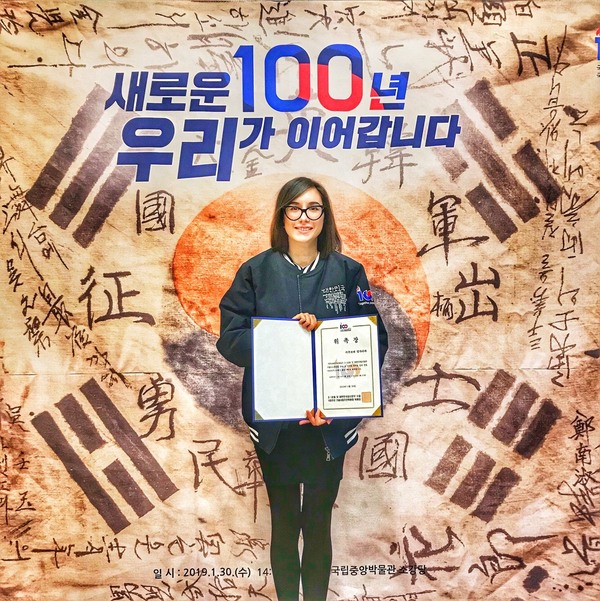 |
|
On Jan. 30, Margarita Kichukova of Bulgaria holds up her certificate as one of the “100th anniversary supporters” formed to commemorate the Mar. 1 Independence Movement’s centennial.
|
Margarita Kichukova to tour Provisional Government sites in China
“I think that the Mar. 1 Movement was an incredible illustration of the value of nonviolence. I’m frequently surprised by how similar Korea’s history is with Bulgaria’s. Bulgaria was ruled by the Turks for 500 years and was then invaded by the Soviet Union. That’s why I’m drawn to the Korean independence movement.” Bulgarian-born Margarita Kichukova’s interest in Korean history is as remarkable as her Korean language ability. This 24-year-old came to Korea to study three years ago and is currently enrolled in a master’s program in political studies at the Academy of Korean Studies. The topic of her thesis is Bulgaria’s policy of supporting North Korea during the Korean War. During the process of researching Korea’s contemporary history, Kichukova says, her area of interest has naturally broadened to include the Korean independence movement during Japan’s colonial occupation. As it happens, Kichukova will be heading to China on Mar. 18 to tour sites where the Provisional Government of the Republic of Korea was once based. She was one of applicants chosen to join the tour, which is being jointly organized by South Korea’s Ministry of Culture, Sports and Tourism (MSCT) and by the Committee for Programs for the 100th Anniversary of the Mar. 1 Movement and the Establishment of the Provisional Korean Government (abbreviated as the Mar. 1 Movement Committee, chaired by Han Wan-sang). At this point, Kichukova could be well called half-Korean. “Foreigners have at least heard the name of Syngman Rhee, but few people know about Kim Koo. I signed up for the program because I want to learn more about Kim Koo, who remained the leader of the Provisional Government until the very end, and to tell Bulgarians about him,” Kichukova said. After taking an interest in the Silhak (“practical learning”) ideology of the late Joseon Dynasty, Kichukova learned about the Donghak Peasant Revolution, which is how she got into Kim Koo, who was a leader of the Donghak troops. Kichukova offered some diplomatic criticism of former president Syngman Rhee: “A range of opinions appear in the literature, but as I see it, Syngman Rhee made a lot of mistakes as a democratic leader.” Kichukova owes her extensive knowledge of Korea to her major in Korean studies. She graduated with an undergraduate degree in that subject from Sofia University, Bulgaria’s oldest public university. “The Korean studies department was established in 1995, and there’s one Korean professor and several Bulgarian professors there. They admit 15 students every year, so there are about 60 students in the department. At first, I thought that Korea, China and Japan all had similar histories and cultures. But I learned about the differences when I was taking courses in Chinese and Japanese history as electives on top of my required course in Korean history,” she said. Kichukova said she sometimes misses food from home and that her favorite Korean celebrity is the actor Lee Jong-suk. While she likes the television dramas and movies in which Lee has starred, the Korean movie she’ll never forget is “Ode to My Father.” “I got to see ‘Ode to My Father’ for free at a movie theater in Bulgaria. I watched it with my family, and I was touched by the life of the father who strove to protect his family amid war and poverty.” The Mar. 1 Movement Committee chose Kichukova to be one of its “100th anniversary supporters” from among applicants from around the country, and she’s been playing a leading role in raising awareness about the Mar. 1 Movement. “If we can realize the values of peace and human rights that were shown by the Mar. 1 Movement on its 100th anniversary, I think we’ll see the day when the Korean Peninsula is unified, just like Bulgaria.” Parallels between Bulgarian and Korean history Kichukova’s vocation as a Korean studies researcher isn’t the only reason she can’t get enough of the history of Korea’s independence movement, including the Mar. 1 Movement. Korea’s traumatic history reminds her of Bulgaria’s own history. “The Japanese colonial occupation of Korea is really similar to what happened to Bulgaria. Just as the Japanese forced their Shinto religion on the Koreans, the Turks forced the Bulgarians to convert to Islam. And just as Japan forced Korean women to become comfort women, the Turks harassed Bulgarian women.” During a six-day tour that will wrap up on Mar. 23, Kichukova and the other participants of the tour will be following in the footsteps of the Provisional Korean Government, which relocated several times in China, from Shanghai to Hangzhou and then to Chongqing. The tour will be attended by ten members of the policy reporter team, under the Culture Ministry’s public relations office, and 20 of the 100th anniversary supporters. The members of the tour run the gamut from the descendants of freedom fighters and foreigners like Kichukova to well-known historians on YouTuber and ordinary young people. While visiting these historical sites, tour members will be reflecting on the significance of the 100th anniversary of the establishment of the Provisional Korean Government and creating a variety of content that captures its contemporary value. Nationality aside, that’s a reason to look forward to the story of the Provisional Korean Government as reinterpreted through the eyes of young people like Kichukova. By Oh Seung-hun, staff reporter Please direct comments or questions to [english@hani.co.kr]






